We Dive Into Your Projects
What were the projects or initiatives you worked on? We probe to understand the scope, the stakes, and the significance.
"Tell me about the biggest project you led last year..."13+ Legal Resume Examples
In Legal, you're competing with 860 applicants per search
You're Not Rejected.
— You're Overlooked —
We fix your legal resume with one conversation
The strongest legal resumes lead with case outcomes, deal value, client relationships, and matter complexity — not practice area lists or bar admissions alone. Hiring partners at firms like Kirkland & Ellis, Latham & Watkins, and Skadden scan for favorable outcome rates, transaction volume, portable business, and proof that your legal work delivered measurable client value. Every resume sample on this page was built through a 1-on-1 interview that extracted the specific litigation, transactional, and advisory outcomes that differentiate candidates in a field averaging 860 competitors per job search.
Each legal resume sample below was written through our 1-on-1 interview process. Click any legal resume example to see the full sample and learn how we transformed their experience into proof.
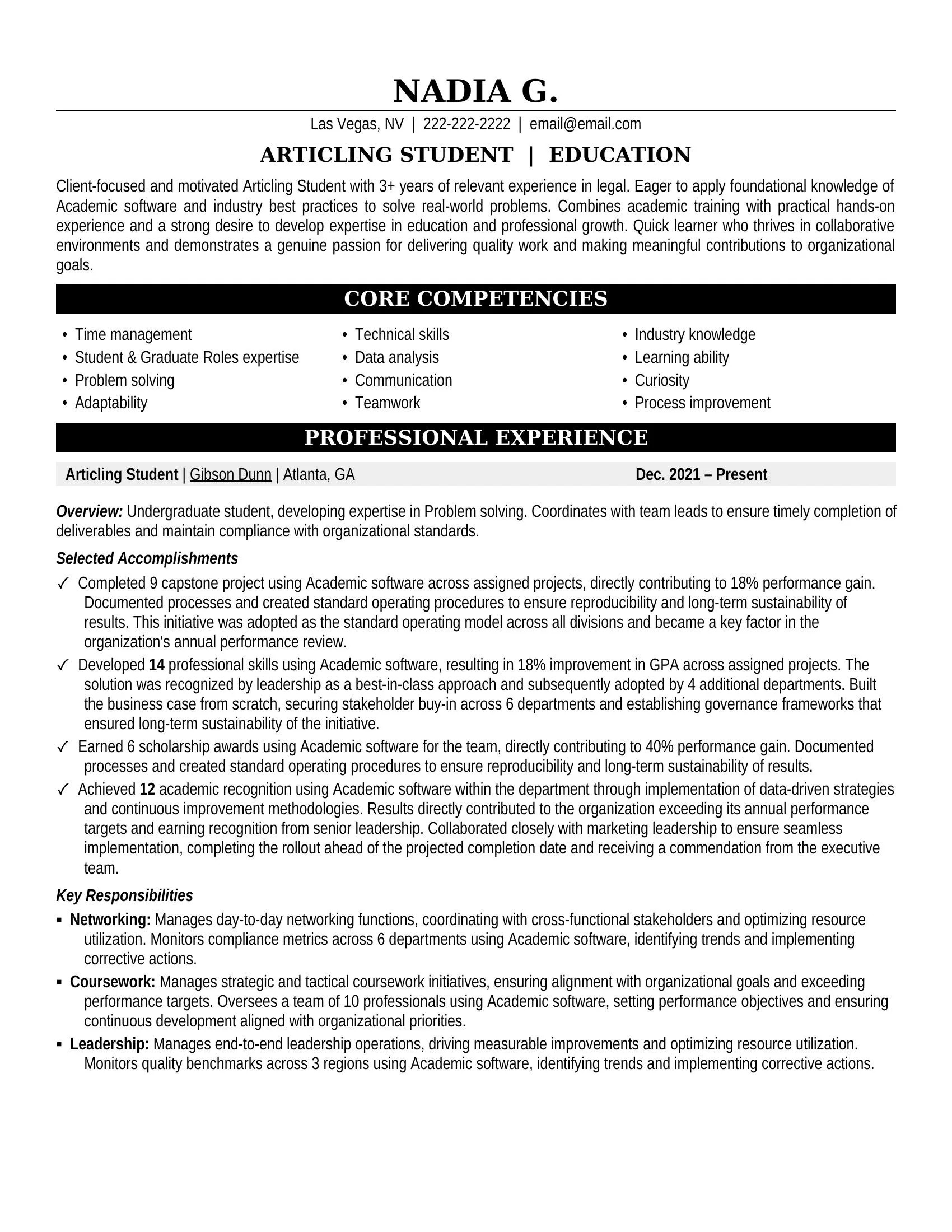
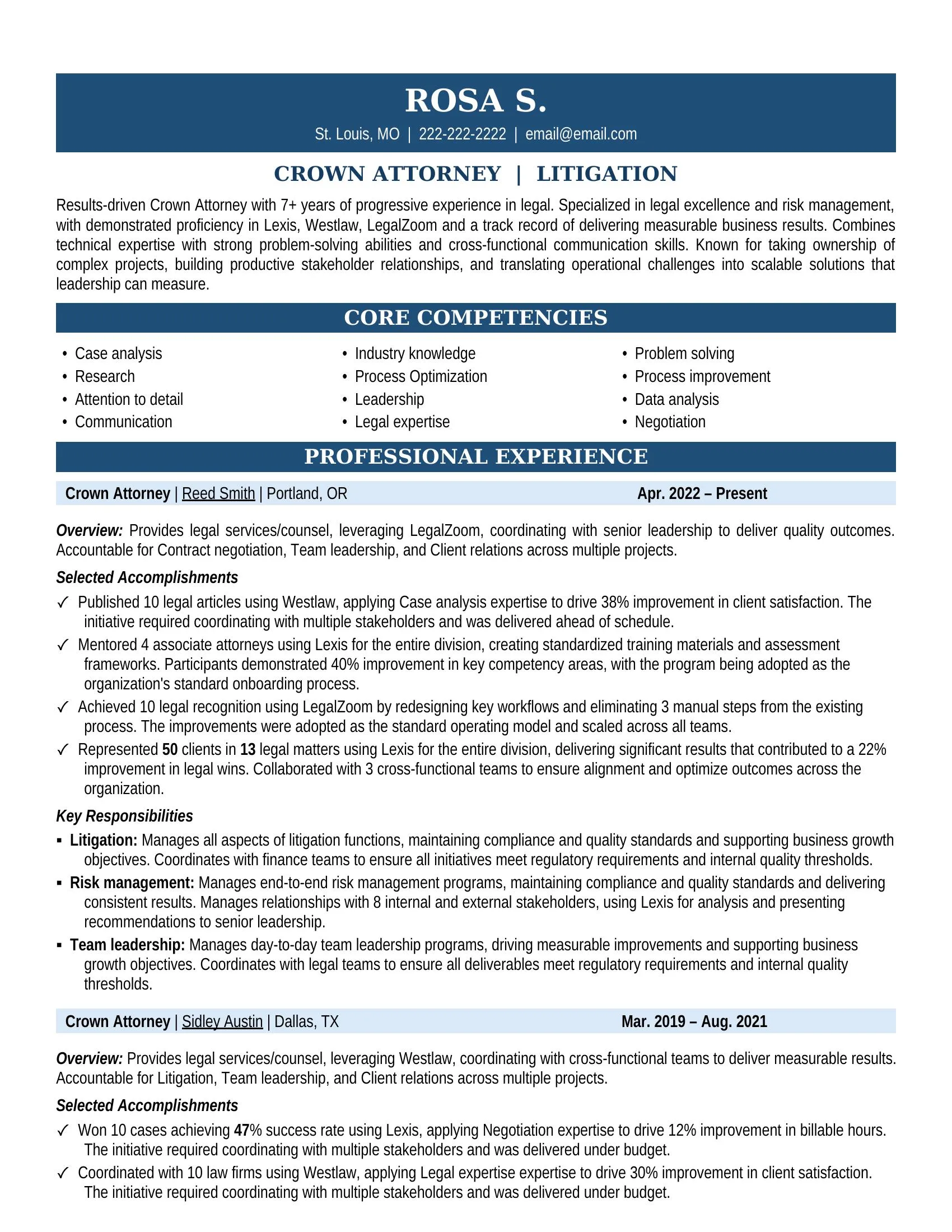
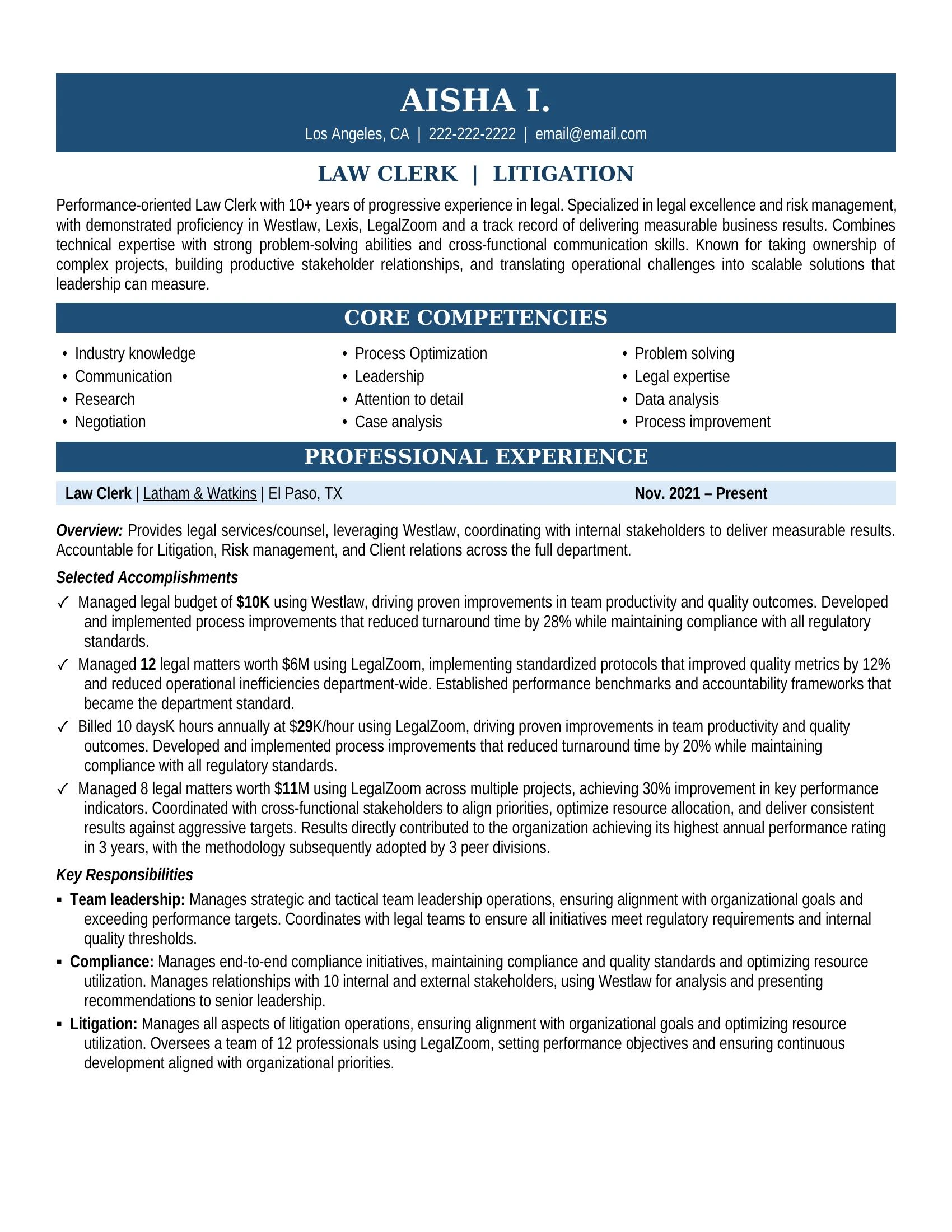
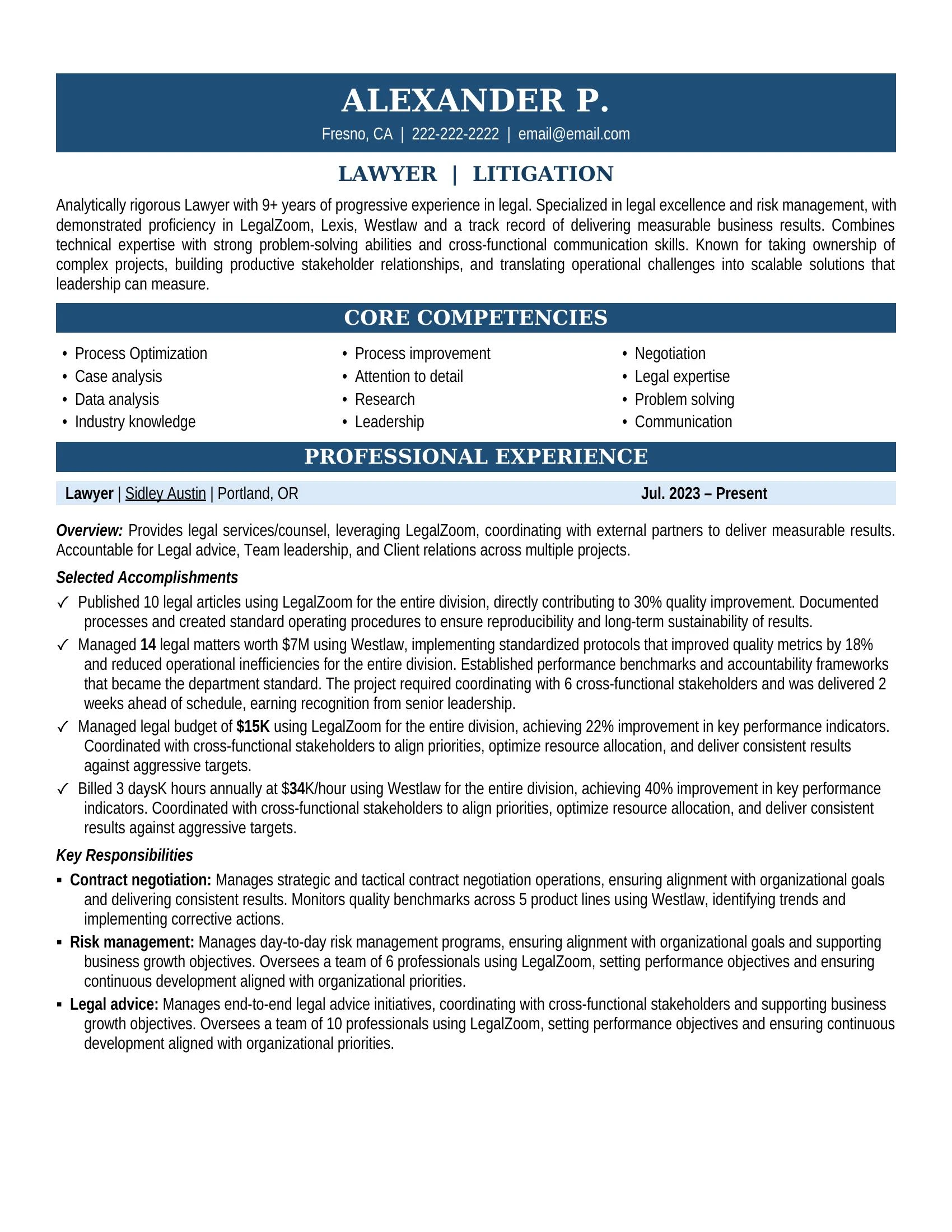
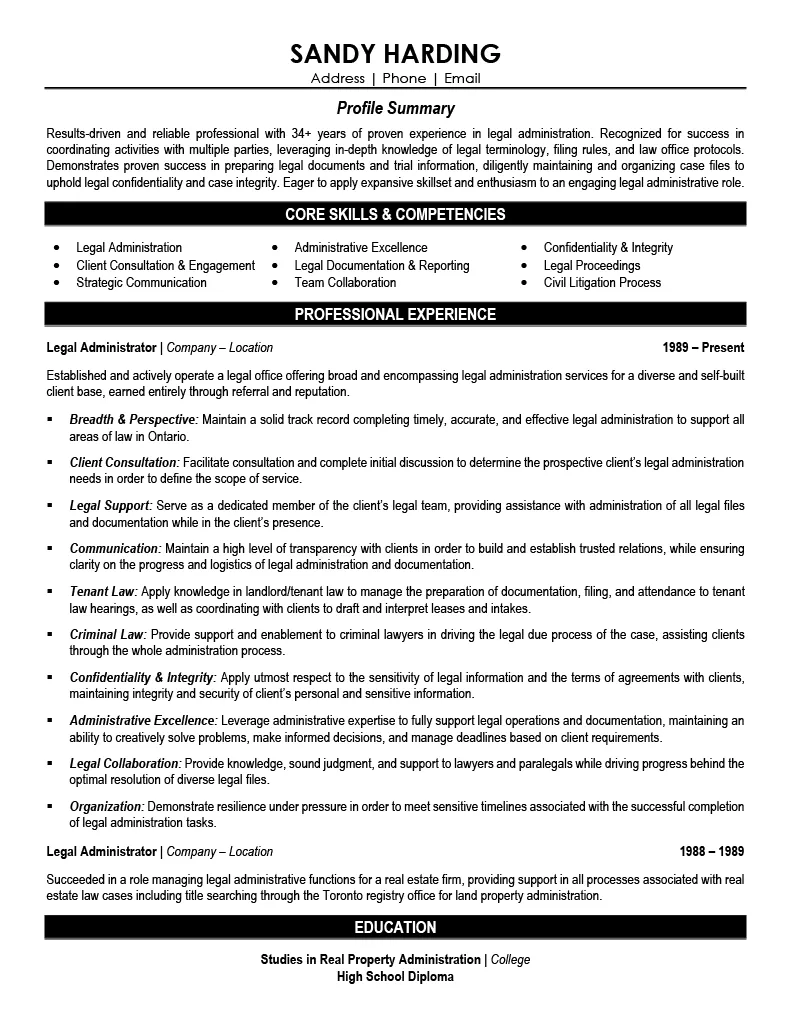
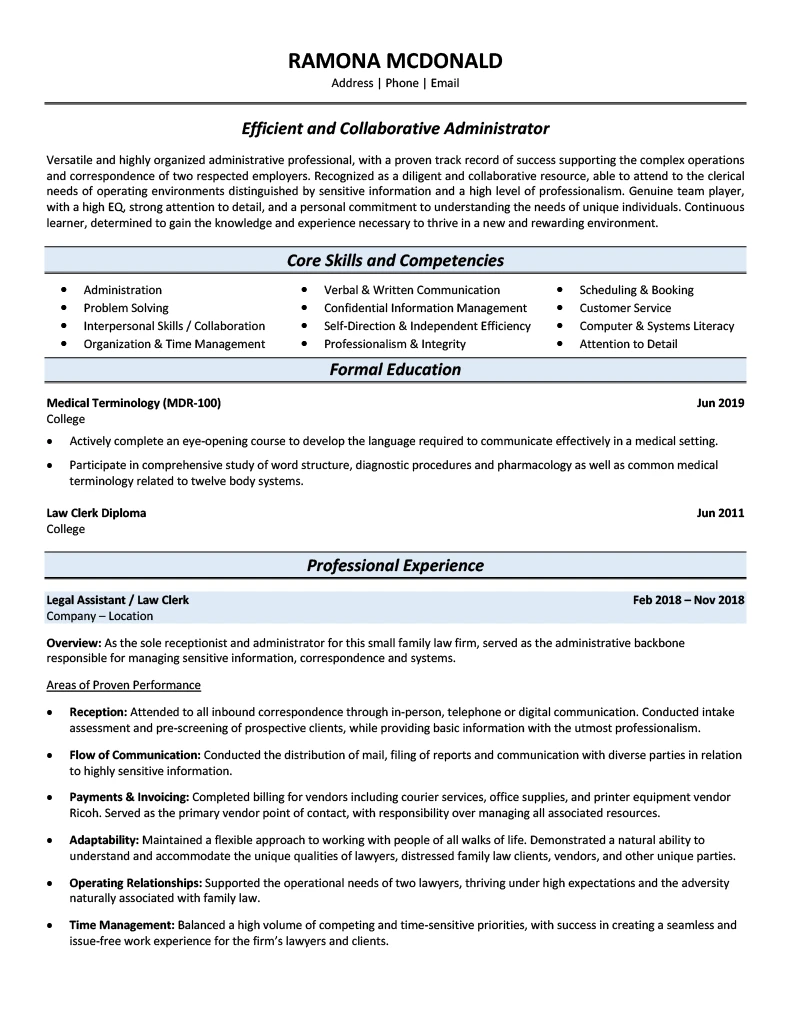
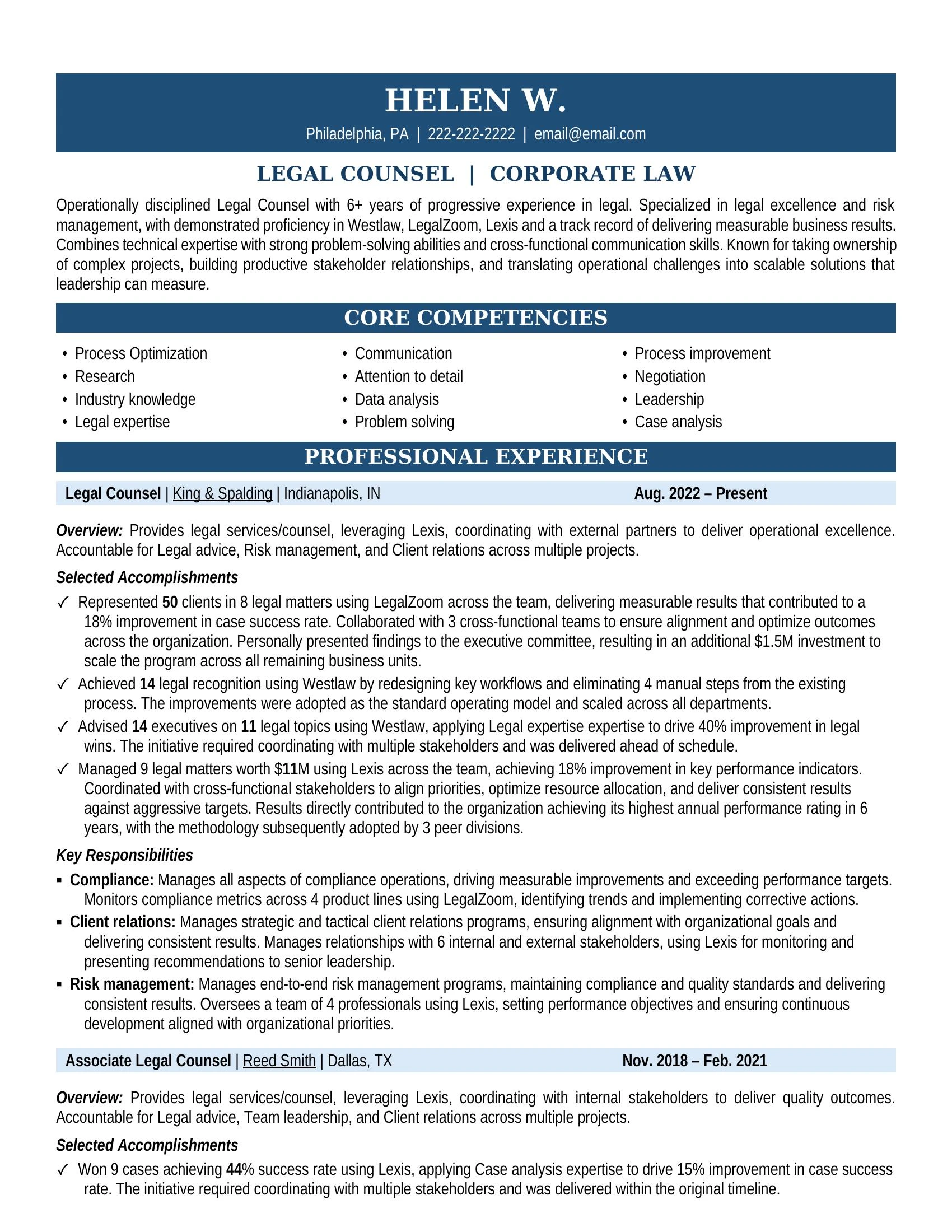
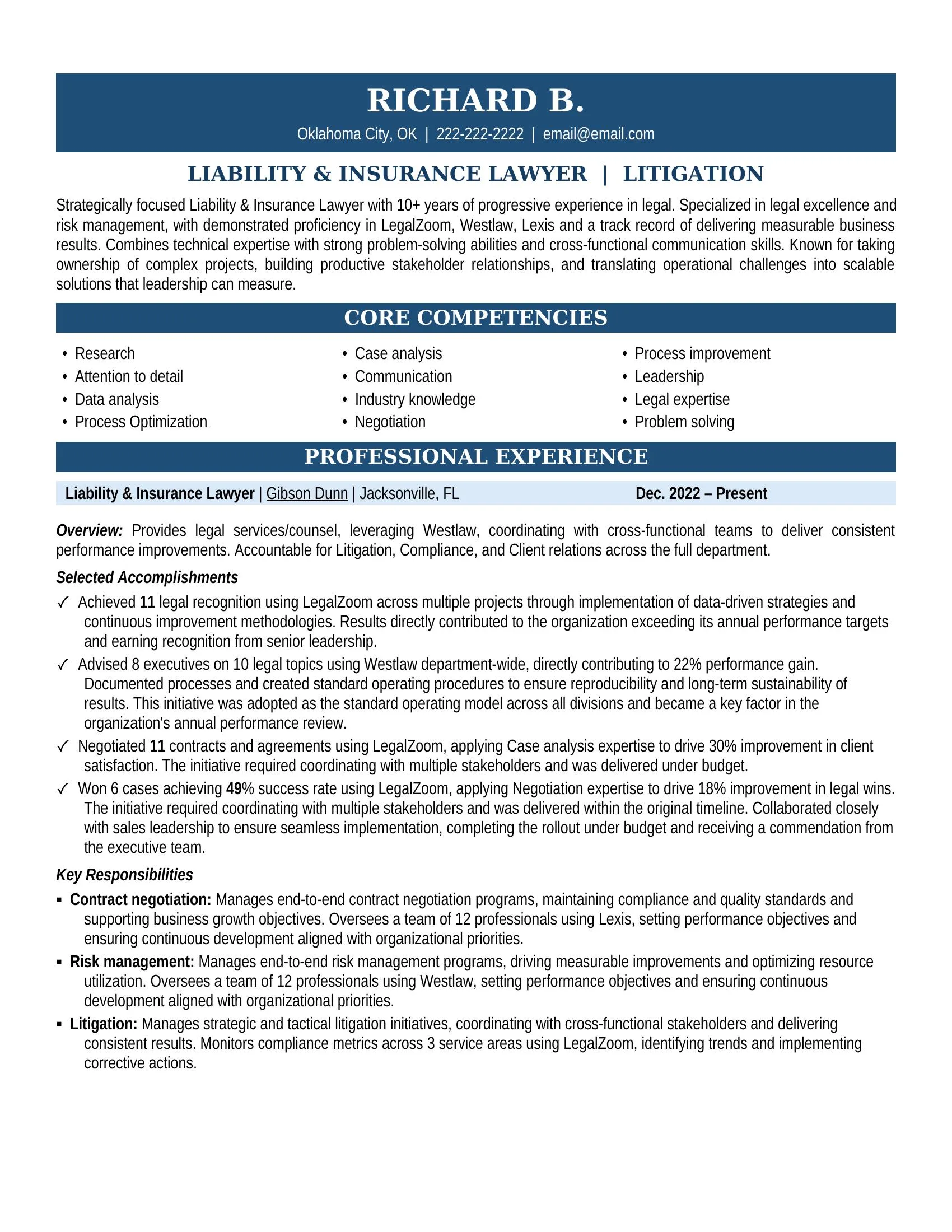
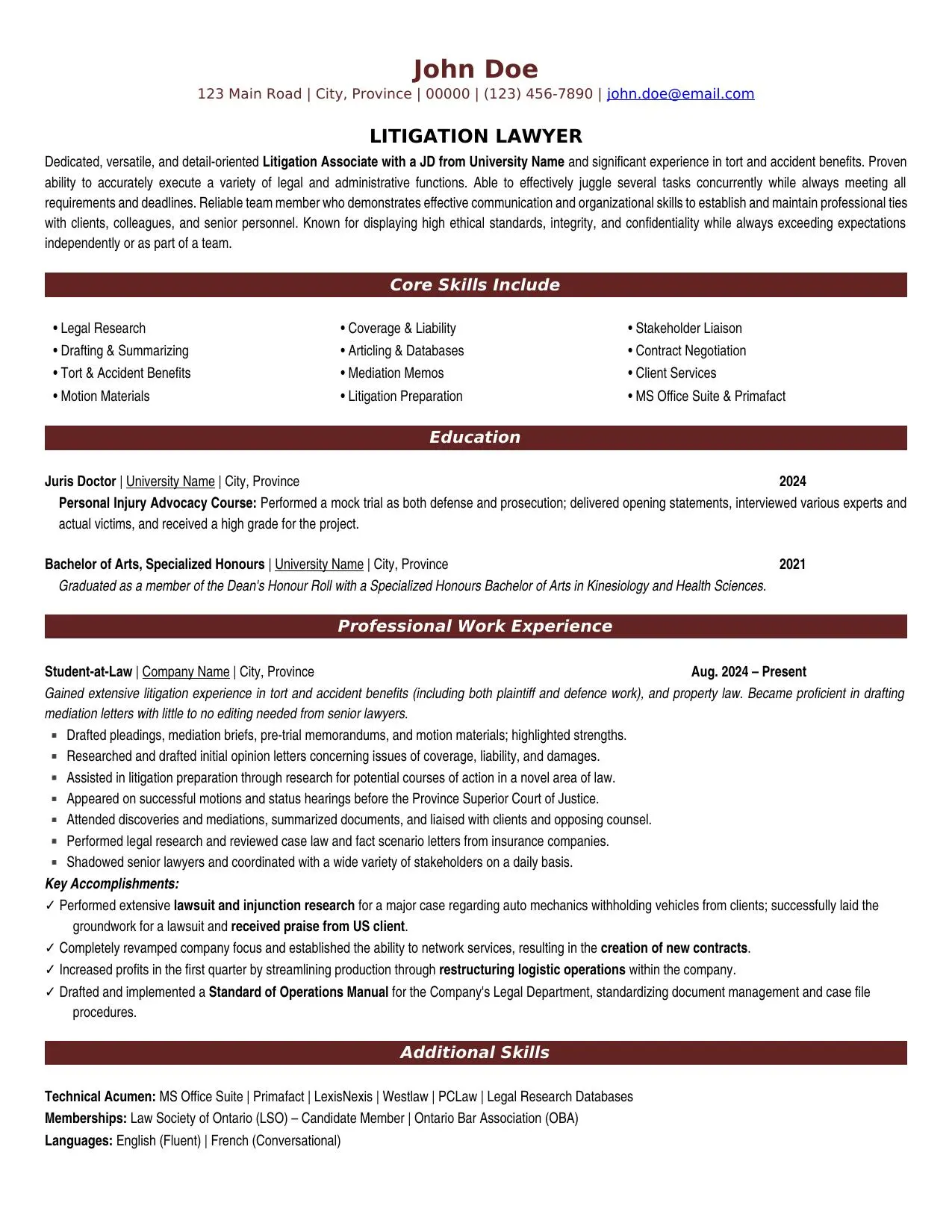
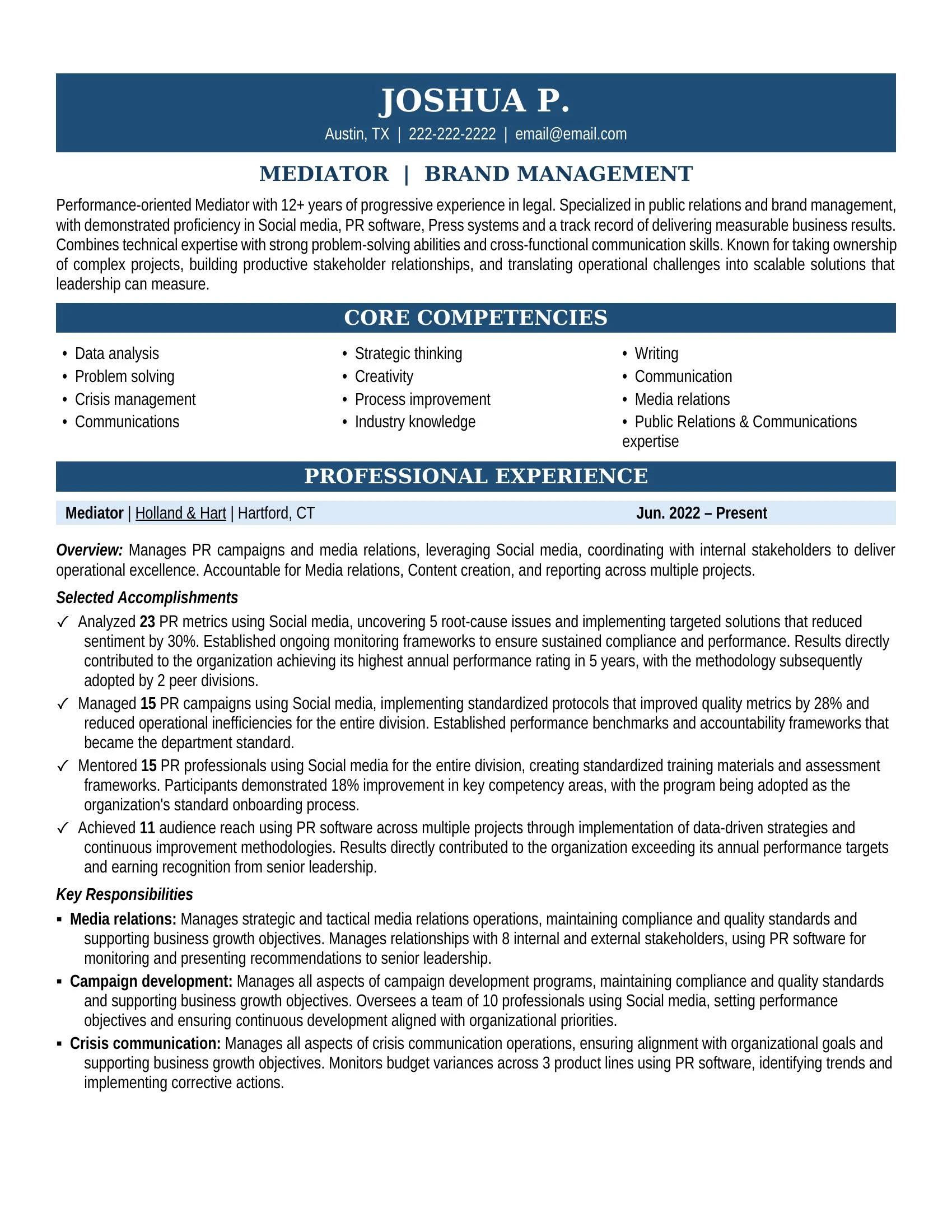
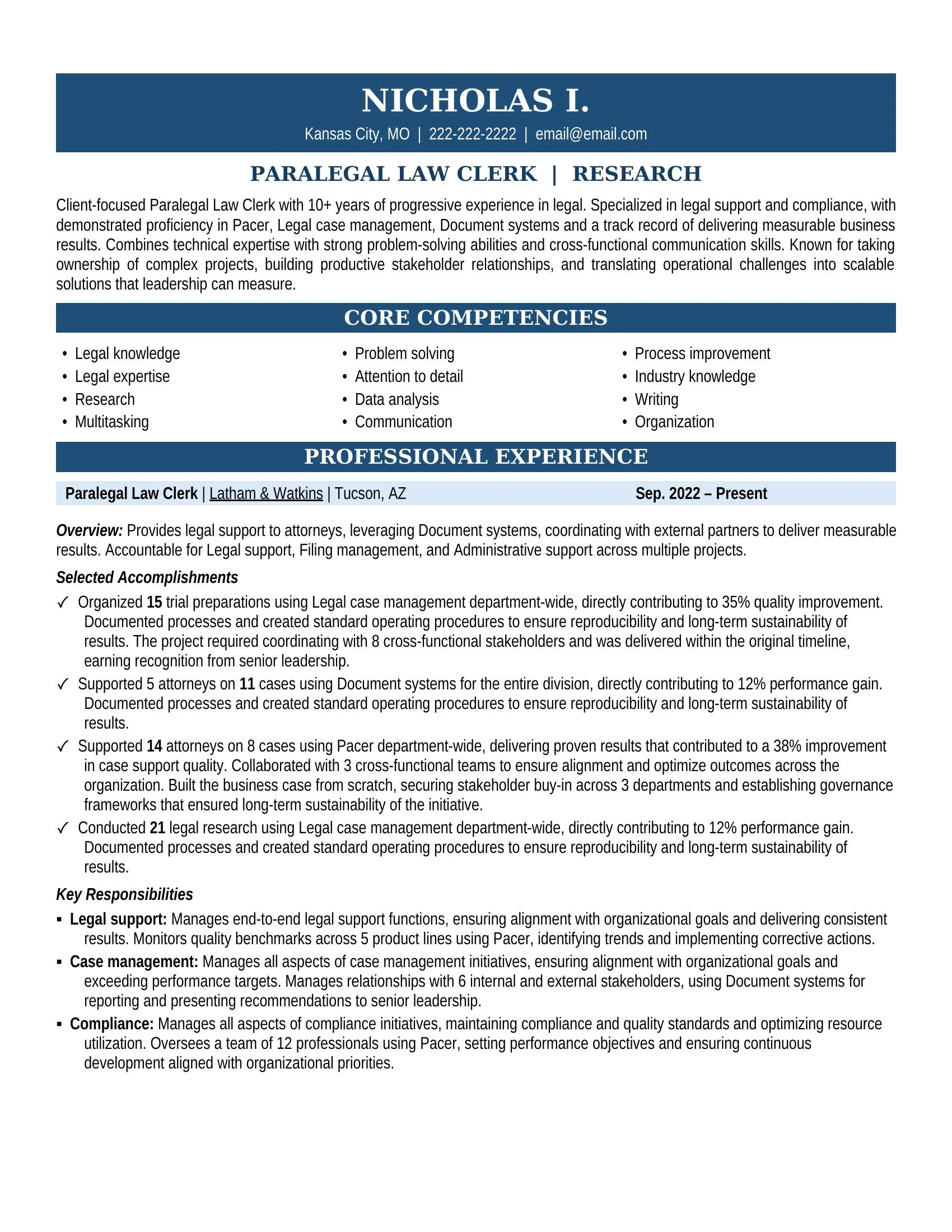
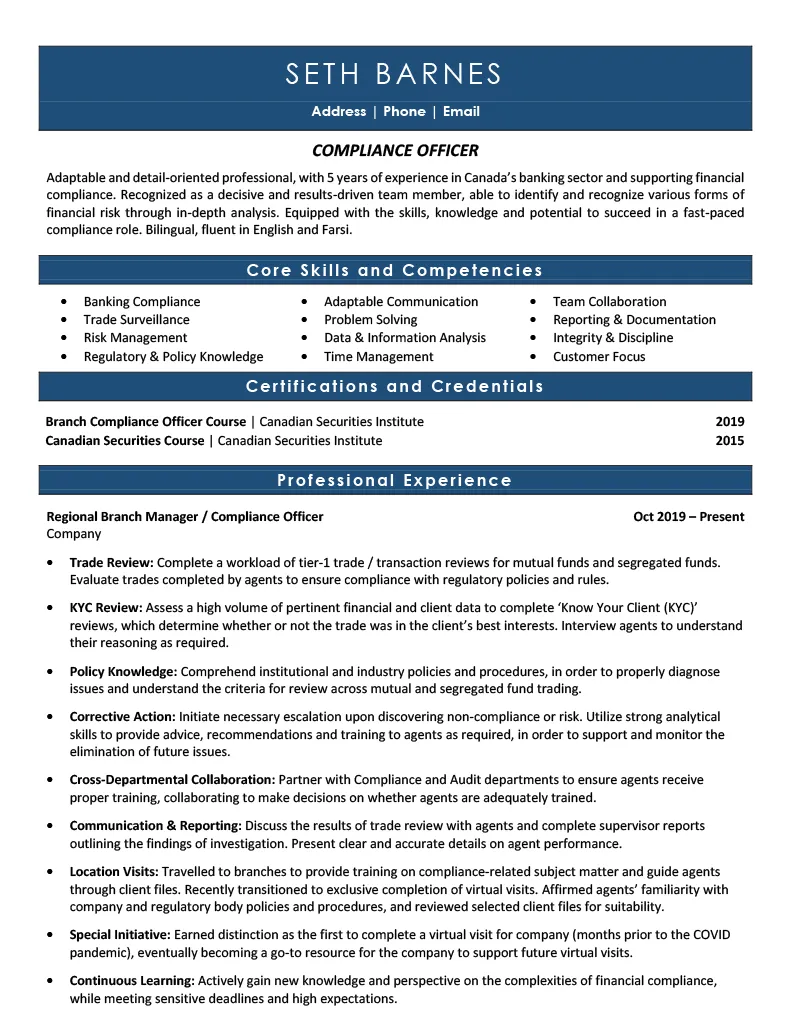
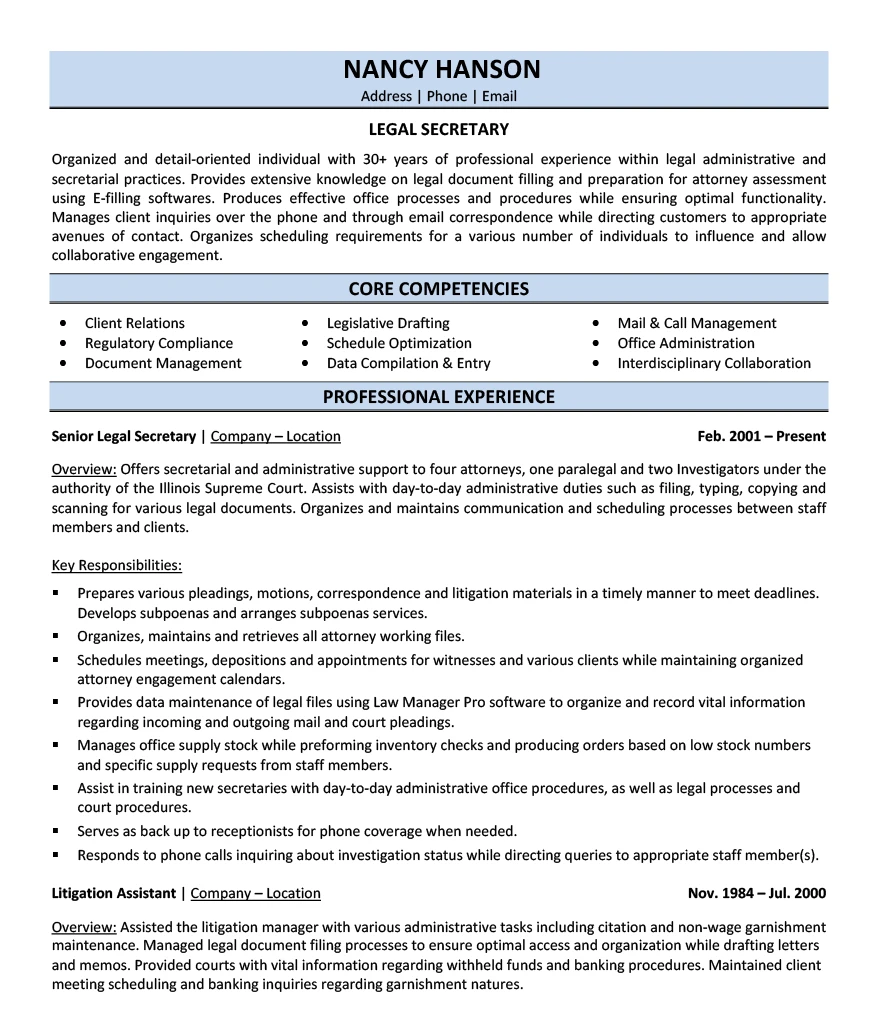
When a hiring manager reads your legal resume, they should think:
"This person has solved the exact problems we're facing."
What were the projects or initiatives you worked on? We probe to understand the scope, the stakes, and the significance.
"Tell me about the biggest project you led last year..."What were the goals of the project? The company's objectives? We connect your work to business outcomes.
"What was the company trying to achieve with this?"What systems, processes, and strategies did you implement? This is where your expertise becomes visible.
"Walk me through how you actually made this happen..."What challenges did you face? What systems did you implement to overcome obstacles?
"What was the biggest challenge, and how did you solve it?"See how our interview process uncovered achievements and turned them into interview-winning proof.
Get Your Legal Resume Written
Legal jobs average 43 applicants per position. You're competing against 860 candidates. Our legal resume examples show how to stand out.
Data based on LinkedIn job postings. Updated Dec 2, 2025.
Here's the math most job seekers don't do:
Your legal resume must stand out against 860 professionals.
What makes you different is the story behind the projects.
Get Your Legal Resume WrittenLegal Professionals Using Our Resume Templates Work At
Every legal resume example on this page was written through our 1-on-1 interview process. We extract achievements you'd never think to include.
We identify keywords and achievements that get legal resumes noticed.
Targeted questions about your legal projects and results.
Transform responsibilities into quantified achievements.
ATS-optimized resume in 3 business days + 14-day revisions.
80% of legal positions are never advertised. Get your resume directly into the hands of recruiters filling confidential searches.
When you purchase our Resume Distribution service, your resume goes to 200+ recruiters specializing in legal — included in Advanced & Ultimate packages.
| Agency | Location |
|---|---|
|
HA
Hays Specialist Recruitment
|
Nationwide |
|
RA
Randstad Staffing Agency
|
Nationwide |
|
KE
Kelly Services Workforce Solutions
|
Nationwide |
|
MA
ManpowerGroup Talent Solutions
|
Nationwide |
|
AD
Adecco HR Services
|
Nationwide |
Legal averages 43 applicants per position across 14,728 active job postings — a field where every candidate has credentials but most resumes fail to prove case outcomes or client value. Litigation Lawyer positions are the most competitive at 48 applicants per opening — where hiring partners scan for legal expertise, case success rates, and client relations. Paralegal Law Clerk roles draw 41, Articling Student positions see 39, and Mediator roles average 37. Law Clerk positions draw 36, Liability & Insurance Lawyer sees 35, Lawyer and Legal Administrator each average 34, Legal Assistant draws 32, Crown Attorney sees 30, and Legal Counsel positions average 28. Apply to 20 positions in a typical 30-day search and you're one of roughly 860 candidates competing. In legal, the resume that quantifies case outcomes, deal value, and client impact beats "represented clients" or "negotiated contracts" every time.
Because legal achievements are case outcomes, deal closings, and client advisory results that questionnaires never capture. A Litigation Lawyer who "represented clients" could describe any attorney with a bar card. Our interview process extracts the legal expertise, case success rates, and client relationship outcomes that prove you win — in a 48-applicant field. A Legal Counsel who "negotiated contracts" becomes someone with documented legal expertise applied to measurable client outcomes, case resolution metrics, and advisory impact — at 28 applicants per opening. A Paralegal Law Clerk who "supported legal matters" becomes someone with quantified legal knowledge, organizational precision, and attention to detail applied to matter outcomes — at 41 applicants. A Legal Assistant who "worked in the field" becomes someone with documented attorney support capacity, deadline management, and organizational impact. A questionnaire reduces all of them to "legal professional with J.D. or paralegal certificate." The interview captures the case outcomes, the deal values, and the client impact.
They're screening for outcomes and client value — not credentials or practice area lists alone. For Litigation Lawyers: legal expertise, case success rates, client relationship management, and favorable outcome percentages — at 48 applicants, every competitor brings bar admission and courtroom experience. For Liability & Insurance Lawyers: defense outcomes, coverage analysis, and claims resolution expertise — at 35 applicants. For Legal Counsel: advisory impact, contract negotiation outcomes, case success, and client relations — at 28 applicants. For Mediators: communication skills, resolution rates, and crisis management capability — at 37 applicants. For Paralegals and Law Clerks: legal knowledge depth, attention to detail, organizational precision, and attorney support capacity — at 36-41 applicants. For Legal Administrators: firm operations, case management efficiency, and client service outcomes — at 34 applicants. For Articling Students: GPA, internship results, technical skills, and leadership potential — even entry-level at 39 applicants demands proof of impact. ATS systems at firms like Kirkland & Ellis and Latham & Watkins keyword-scan for practice areas, bar admissions, and matter types before a hiring partner reviews your resume.
It matters fundamentally — these are different legal tracks evaluated by completely different criteria. Litigation proves advocacy through case success rates, favorable outcome percentages, recovery amounts, and courtroom experience — Litigation Lawyer draws 48 applicants who all claim trial capability. Transactional and advisory proves deal capability through transaction volume, deal value, client advisory outcomes, and contract negotiation results — Legal Counsel draws 28 applicants but each brings substantive deal experience. Specialty practice proves niche expertise — Liability & Insurance Lawyer at 35 applicants requires defense outcomes and coverage analysis; Crown Attorney at 30 requires prosecution track record. Mediation and ADR proves resolution capability through communication skills, resolution rates, and crisis management — at 37 applicants. Legal support proves operational impact — Paralegal Law Clerk at 41 applicants requires legal knowledge and organizational precision; Legal Administrator at 34 requires firm operations management. During your interview, our writers identify your legal track and extract the case outcomes, deal values, and client impact that hiring partners evaluate.
Our legal resume packages are based on career level and interview depth — from a 30-minute early career session to a 90-minute executive interview. When evaluating price, consider what the number actually buys. A company charging $99: after the company takes its margin, the writer earns $40-60 — enough for about 45 minutes of total work including writing. That's a questionnaire reformat that produces "represented clients and negotiated contracts." Our Professional-level interview alone is 60 minutes, followed by job posting analysis, drafting, and revisions — producing quantified case success rates, deal values, and client advisory impact that prove legal capability in a field averaging 43 applicants per position. View current packages and pricing.
We offer a 90-Day Interview Guarantee. If you don't land interviews within 90 days of receiving your final legal resume, we rewrite it free of charge. We can make this guarantee because our interview-based process produces resumes built on the case outcomes, deal values, and client impact that law firms and legal departments respond to. Browse the resume samples on this page to see the quality of work we deliver.